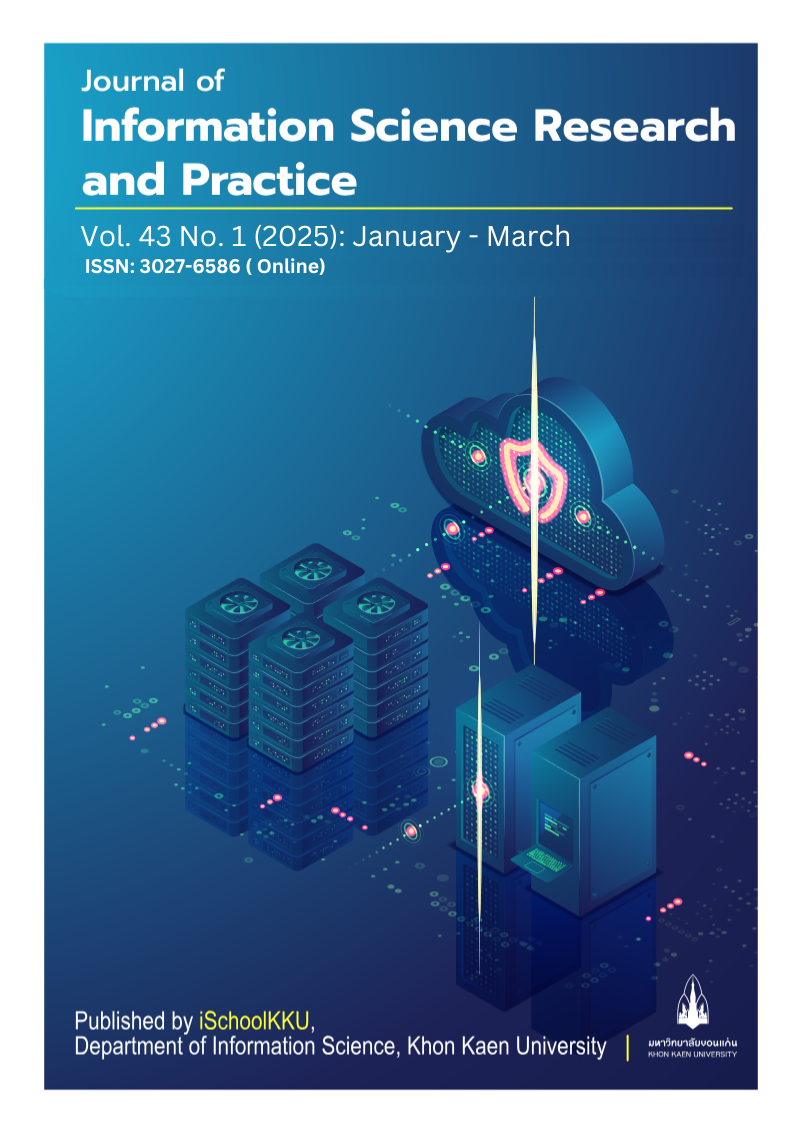The Development of Thai Herbal Ontology to Support Information Search Using SPARQL
DOI:
https://doi.org/10.14456/jiskku.2025.4Keywords:
Herbal information search, Ontology, SPARQLAbstract
Purpose: 1) To develop an ontology for herbal information search using SPARQL. 2) To evaluate its search performance.
Methodology: This study employed a research and development approach, involving content analysis and categorization, ontology development and information search, expert evaluation, and statistical data analysis.
Findings: 1) The research developed an ontology with 3 main classes and 125 subclasses, defining 98 data properties and 45 object properties related to herbal data. 2) Model evaluation showed accurate herbal information search, achieving 100% precision, 93.68% recall, and 96.74 F-measure.
Applications of this study: 1) The developed herbal ontology can be used in semantic web systems to query herbal usage and APIs to improve the efficiency of herbal information search. 2) For other ontologies with ambiguous data, this process may serve as a guideline for developing ontologies in similar fields.
Downloads
References
Aditya, N., Baizal, Z. K. A., & Dharayani, R. (2023). Healthy food recommender system for obesity using ontology and semantic web rule language. Building of Informatics, Technology and Science (BITS), 4(4). https://doi.org/10.47065/bits.v4i4.3005
Golden Jubilee Medical Center. (2024). Yasamunphrai plotphai muachai thuk lak [Herbal medicine is safe when used correctly]. (In Thai). Retrieved from https://www.gj.mahidol.ac.th/main/ttm/herb-right/
Gruber, T. R. (1993). A translation approach to portable ontology specifications. Knowledge Acquisition, 5(2), 199–220. https://doi.org/10.1006/knac.1993.1008
Hunter, J. (2001). MetaNet: A metadata term thesaurus to enable semantic interoperability between metadata domains. Journal of Digital Information, 1(8), 1–17.
Jaitae, S., Rattanapunya, S., & Pangsiri, M. (2019). Indigenous herbal knowledge for health promotion: A case study of Lum Nam Li Basin, Lamphun province. Journal of Community Development and Quality of Life, 7(2), 134-143.
Jaitae, S., Sommanee, C., Jinasuk, W., & Thumjai, P. (2021). Utilization and policy recommendation to the traditional herbal conservation: Case study Salung – Keelek community, Mae Rim district, Chiang Mai Province. Community and Social Development Journal, 22(2), 90–102. https://doi.org/10.14456/rcmrj.2021.246390
Kaewboonma, N., Chansanam, W., Puttarak, P., & Damsud, T. (2019). Semantic knowledge management for herbal medicines used in primary health care. TEST Engineering & Management, 81, 666–671.
Muhammad, F., Baizal, Z. K. A., & Dharayani, R. (2023). Ontology-based recommender system for personalized physical exercise in obesity management. Sinkron: Jurnal Dan Penelitian Teknik Informatika, 8(3), 1699–1708. https://doi.org/10.33395/sinkron.v8i3.12689
Nantiruj, T., Maneerat, N., Varakulsiripunth, R., Izumi, S., & Takahashi, K. (2011). An e-health advice system 4with Thai herb and an ontology. The 3rd International Symposium on Biomedical Engineering. Bangkok: National Electronics and Computer Technology Center.
Noy, N. F., & McGuinness, D. L. (2001). Ontology development 101: A guide to creating your first ontology. Retrieved from https://protege.stanford.edu/publications/ontology_development/ontology101.pdf.
Paipong, S. & Pinitsunthorn, S. (2016). Knowledge and role of village health volunteers in community health planning, Phen district, Udon Thani province. Journal of Community Health Development, Khon Kaen University, 4(2), 291-305.
Penchun, P., & Wongtangprasert, S. (2015). Principles of safe herbal medicine use: The 5 rights of herbal medicine administration. Nonthaburi: Institute of Thai Traditional Medicine, Department of Thai Traditional and Alternative Medicine.
Prakritkornchai, S. (2007). The creation of a prototype ontology for Thai herbal plants. (In Thai). Bachelor’s Project in Computer Science, King Mongkut's University of Technology North Bangkok.
Prathanturarug, S., Saralamp, P., Soonthornchareonnon, N., & Uthaiwittayarat, T. (2005). A review of research and knowledge management measures for the preservation, development, and protection of Thai wisdom and traditional health. (In Thai). Bangkok: Health Systems Research Institute.
Thongjing, P. (2009). Ontology for semantic integration of Thai herbal knowledge. (In Thai). Master’s Thesis in Computer Science, Thammasat University.
Tungkwampian, W. (2015). Development of Thai herbal medicine knowledge base using ontology technique. The Thai Journal of Pharmaceutical Sciences, 39(3), 102-109.
Uschold, M., & Gruninger, M. (1996). Ontologies: Principle, methods and applications. Knowledge Engineering Review, 11(2), 93-155.
W3C. (2004). SWRL: A semantic web rule language combining OWL and RuleML. Retrieved from https://www.w3.org/Submission/SWRL/
Wamanont, M., et al. (Eds.). (1997). Herbal medicines in primary health care (2nd ed.). Bangkok: War Veterans Organization of Thailand.
Williams, I., Yuan, X., Anwar, M., & McDonald, J. T. (2022). An automated security concerns recommender based on use case specification ontology. Automated Software Engineering, 29(2). https://doi.org/10.1007/s10515-022-00334-0








